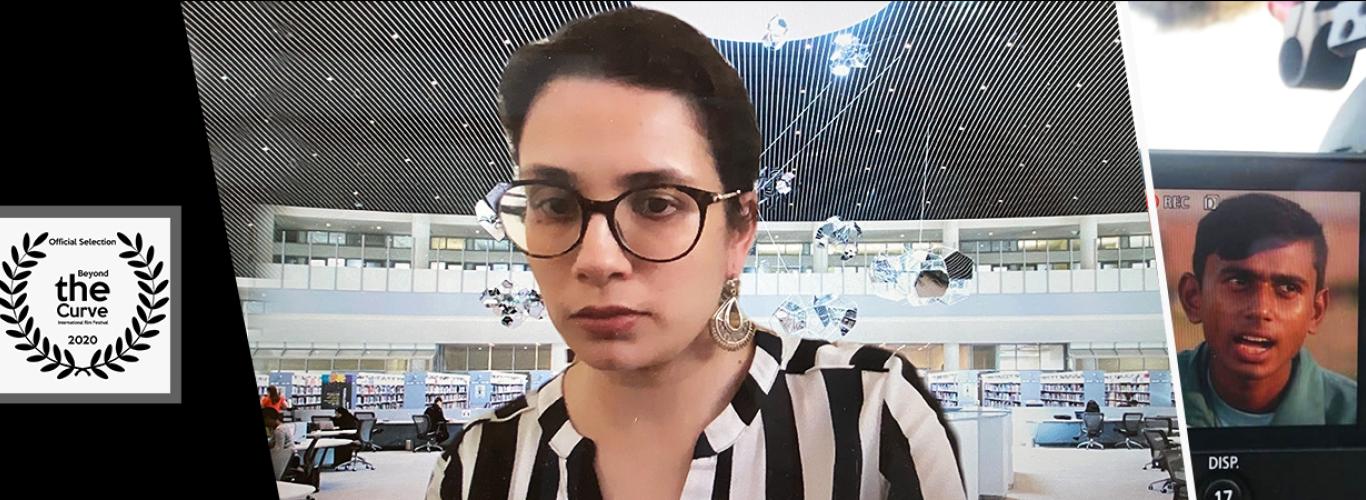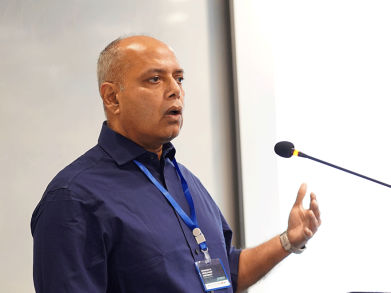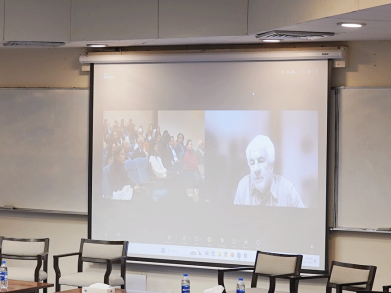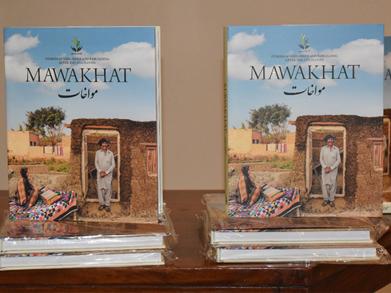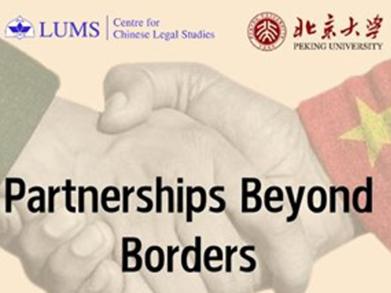The Perfect Storyteller: Saba Karim Khan, Alumna BSc 2006
Can football produce a movement to change the destinies of Pakistan's street children?
"Actually, yes!" exclaims Saba Karim Khan, a Mushtaq Ahmad Gurmani School of Humanities and Social Sciences alumna (BSc 2006) and a Dean's Honour List awardee. A visual storyteller, author and educator, her recently directed documentary, Concrete Dreams: Some Roads Lead Home, won the Excellence award at the Docs Without Borders Film Festival, USA, best documentary award at the Indian World Film Festival, the Tagore International Film Festival and the Calcutta International Cult Film Festival, and has been officially selected at the France-based, Beyond The Curve International Film Festival.
“Courage. Resilience. Hope. Concrete Dreams hopes to convey those things. I struggle recalling positive news about Pakistan. It’s mostly a slew of fear-invoking threats about to rain down – death, destruction, decay – cremating people’s desires for a happy future.” Khan's film, a foil against the winds of despair blowing in Pakistan, pivots around two young boys, Owais and Salman, threading through Karachi’s traffic before deciding not to sacrifice their lives at the altar of elite apathy. Becoming football champions, they spark the “I am Somebody” movement to impact the lives of other street children. "Going from having no birth certificates, never seeing an airport, to winning Bronze for Pakistan at the Street Child Football World Cup in Rio…I wanted to capture their voluminous inner strength, show it isn’t confined to the territory of the privileged," explains Khan.
Working at the Social Research and Public Policy department within the Social Science Division at New York University Abu Dhabi, Khan has written for The Guardian, The Independent, Wasafiri (UK), HuffPost, Verso, Think Progress (USA), DAWN, The Friday Times and Express Tribune. Her debut novel – Skyfall – is forthcoming by Bloomsbury in December 2020.
Khan credits LUMS as having played an integral, indispensable role in shaping her trajectory. “Simply put, it sparked possibilities,” she says. “My parents couldn’t drop me off when I started at LUMS. My brother was starting his sophomore year but would arrive a few days later. When I reached Lahore, my roommate and her mother received me at the airport. The first couple of nights, before the term began, completely alone in the hostel common room, I was of two minds, partially regretting my obstinacy in wanting to study outside my hometown, Karachi. I’d fought hard to get here, my brother had fought next to me, but it was the first time I was this far away from home, from family, from all things familiar. It felt frightening, impossible to survive for long. I remember staying awake that entire first night. However, by the time the semester was in full swing, I’d experienced my first spring in Lahore and won our first basketball tournament, all that changed and my profound craze for LUMS became vacuum-packed.
“The moment one enters LUMS, something miraculous happens; as if those barricades defining who we are, who can think big, who is entitled to elevate their dreams, instantly dissolve – akin to finally entering the 'real world'. Sharing headspace with classmates from neighbourhoods, you’ve possibly never heard of, or being treated as intellectual equals by professors. I rarely recall an instance when discussions of cars, properties, family names zoomed into focus – those peripherals faded away fairly quickly, leaving in their place, a life-long fraternity. I’d be lost without my LUMS story, its participants. To date, they comprise my inner circle,” explains Khan.
“LUMS also turns you into a sort of cultural omnivore, letting you experiment with street plays and Sufi poetry, Manto and Chughtai, huddled around the campus’ arched entrances in the midst of Lahore’s winters, simultaneously opening windows into the worlds of Marquez, Borges, Kafka, without the pressure to appear cerebral,” Khan says.
Khan’s experience at the University enhanced as she went through its rich intellectual discourse, compelling her to question superficial reasoning and reflect on privilege. She feels the standard of liberal arts education at LUMS is at par with international universities, bringing forth a realm of exposure extending well beyond classrooms. “I’d say the biggest gift LUMS gave me was it unlocked my mind, trained me how to think for myself, ask more questions than seek answers, without fearing complexity and chaos. Without reducing me.”
Khan's life itself has been sort of a movement: growing up in a home where struggle was more than just an eight-letter word. "My family didn’t punctuate its standing by fashionably or loosely donning the middle-class label,” explains Khan. “I literally grew up with the sound of strive always on the boil; it isn’t easy, especially whilst attending the most privileged private school in the country! Clambering into rickshaws outside school, cheek by jowl with friends sitting shotgun with uniformed chauffeurs in glistening Mercs, watching my mother bartering worn-out clothes and newspapers to peddlers who absurdly seemed to be willing to pay for them, riding the X3 public bus from Boat Basin, then walking a mile from the bus stop to reach tuition classes in Saddar to secure that A in O-Level Chemistry. But most agonising of all, the night my father died, opening up an excel sheet with my brother and mother, stretching every dollar to see how we might sustain," remembers Khan. “It felt like finding a needle in a haystack.”
However, despite the struggle of being wedged between extreme wealth and extreme poverty, she was not one to be sucked into self-pity; not for long, anyway. The solid atmosphere in her home let her levitate beyond materialistic cravings. A few years later, during a job interview at a multinational, when the recruiter asked about “father-daughter relationships”, Khan found herself divulging that in the 25 years of her life that her father was alive, he never once raised his voice at his kids, yet his values remained ascendant within their home. "When I met the recruiter at dinner for the next round, he told me he’d gone home and baked cakes with his 5-year-old daughter that evening after listening to my story", chuckles Khan.
Khan’s sojourn into the realm of storytelling is quite interesting, to say the least. When she was only six years old, her class teacher called in her parents, complaining that Khan would sit in a corner with her face buried in a book, pretending to read but merely lip-syncing jumbled words. It was unlikely, they said, that a six-year old, could read or understand Enid Blyton. To prove herself, she read an excerpt from The Magic Faraway Tree and earned her acquittal. “That afternoon, I learnt there will be moments which will demand you to swallow your pride, but which fuel the fire,” Khan concedes without bitterness.” This was the first step towards her love for reading.
Growing up, Khan spent Saturday afternoons at the British Council Library. The combined influence of her father and sister became an unshakeable force, paving the way for her own creative ambitions. “I read my sister’s verses, marvelling at how someone so young could weave magic so potent,” Khan says. Speaking about the poetry of life was part of dinner-table conversations. Over time, she gained prominence with her name appearing in by-lines of local and international publications. Khan recalls how her experience at LUMS swelled the desire to delve into storytelling.
"When it was time to choose my senior project at LUMS, I was audacious enough to attempt a novella - The Morning After - backed by my supervisor, Dr. Ali Khan, whose contributions to my journey at LUMS and beyond, I can never adequately acknowledge. He is the poster professor for paying-it-forward! I’m certain his faith in my creative endeavours provided spur for Skyfall to eventually take flight."
Currently, Khan is collaborating on a research project examining the relationship between jihadist propaganda and violence among young men in Afghanistan. She has forthcoming academic publications in Sentio and Excursions and is contributing a chapter to Mother's Mothering and Covid-19: Dispatches from a Pandemic, slated for publication in March 2021 by Demeter Press, Canada. She’s received a Researcher-Led Initiative (RLI) grant to direct a mini-series that unpacks #metoo among college survivors from South Asia.
LUMS continues to occupy centre-stage for Khan. “My craving to return to LUMS isn’t going away anytime soon,” Khan confesses. “To reconnect with those who’ve impacted my life-choices, but also perhaps teach a term. That’ll be a real homecoming.”
Today, as Khan awaits the publication of her debut novel, Skyfall, by Bloomsbury in December 2020, LUMS wishes her the best of luck for all her future endeavours. “‘Skyfall’ is the last attempt you make against a group of people when outnumbered,” Khan explains of her novel. “LUMS crystallized a similar spirit within me - for that and much more, I remain eternally indebted to my alma mater.”

